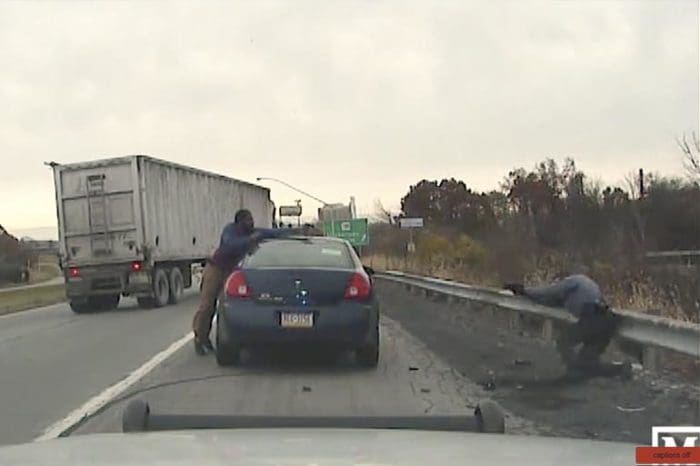On November 7, 2017 a Pennsylvania State Police officer pulled Daniel K. Clary over for speeding. All went as expected until . . .
The video showed Seiple hand Clary a ticket and begin to drive away, before the motorist motioned for him to come back. As he talked more with Clary, Seiple became suspicious of whether he was driving impaired, leading to field sobriety tests and Kelly’s arrival at the scene on the side of the highway.
As the video shows, Clary couldn’t put one foot in front of the other without stumbling and when the officers tried to cuff him, he resisted and a hell of a struggle took place.
Despite being TASERed, Trooper Ryan Seiple and Cpl. Seth Kelly couldn’t get him under control. After trying to grab one of the officers’ guns, Clary eventually broke loose, grabbed a handgun from his car and opened fire on the officers.
Here is the video:
Kelly was hit in the leg during the exchange of gunfire, severing his femoral artery, and almost died. Clary drove himself to a hospital despite a bullet in his head. He was tried and convicted in June.
After less than two hours of deliberations, the jury convicted the 22-year-old Chestnuthill Township, Monroe County, man of nine crimes that could send him to prison for decades, including attempted murder of law enforcement officers, disarming police, resisting arrest and escape. Jurors acquitted Clary of driving under the influence of marijuana, the charge for which the troopers sought to arrest him last year.
Now, after a legal battle, prosecutors have finally released dashcam video of the traffic stop, the struggle and the shootout. But that didn’t happen until a suit was filed to force the video’s release.
The video was released after The Morning Call sued to get a copy of it because prosecutors initially declined to make it public, though it was introduced as evidence at Clary’s trial. In a motion July 27, attorneys for the newspaper asked Judge Stephen Baratta to order its release, noting it had been played in open court.
“The Morning Call sought access to the dashcam video because the attempted homicide of two state troopers and Clary’s allegation that the troopers used excessive force are of great concern to the public in the current environment,” said Theresa Rang, the newspaper’s interim editor.
Joshua Bonn, a lawyer for The Morning Call, wrote in the suit that given “the public’s overwhelming right to access judicial records,” there was no compelling reason to withhold the video.
Pennsylvania goes to great lengths to ensure that dashcam and bodycam videos aren’t made public.
Last year, the state Supreme Court opened the door for some police videos to be accessible under the state’s Right-to-Know law, finding that in some circumstances, they were public records. But just eight days later, the Legislature approved a bill that changed those rules.
Under Act 22, police audio and video are no longer subject to the Right-to-Know law and its presumption of access. The act established new restrictions on their release: a request for a recording must be made within 60 days of its production, and police are granted even wider latitude to deny requests for recordings they deem to be part of an investigation.
Under the new language, authorities can keep recordings secret if they contain “potential evidence in a criminal matter” or “information pertaining to an investigation.”
That’s at least arguable while a case is pending, but the Clary video had already been viewed as evidence in open court, a verdict had been reached and the trial long concluded.
The dispute over the video’s release never saw a courtroom. A day before a hearing was scheduled before (Judge Stephen) Baratta, the district attorney’s office reversed course and agreed to provide the recording to The Morning Call.
First Deputy District Attorney Terence Houck said Thursday he always wanted the video to be released to the public, but needed to make sure Kelly and Seiple agreed.
“Our concerns have always been the victims, the state troopers in this matter, protecting them,” Houck said. “But after speaking with them, they wanted it released, as did I.”
With all due respect, the officers’ wishes should have no bearing on the matter. Dashcam and bodycam video are public records paid for with tax proceeds. Citizens have a right to see how their hard-earned dollars are being spent. And dashcam and bodycam footage protects police officers from bogus claims of brutality.
Perhaps prosecutors settled with the Morning Call because they didn’t want the case advancing in the courts. Updated law or not, continuing to keep video evidence — in effect public records — such as this from view could (and should) be a tough legal row to hoe.
